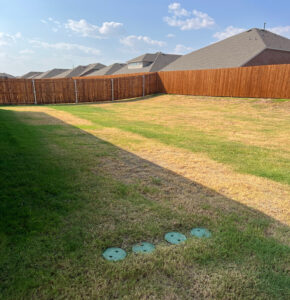Will Lawn Fungus Go Away On Its Own?
 At Lawn Sense, we frequently encounter questions from homeowners about whether lawn fungus will resolve itself without intervention. It’s a common concern, especially when unexpected fungal outbreaks mar the beauty of a well-maintained lawn. The simple answer is: it depends. However, without proper management, most fungal problems can persist or worsen, leading to significant damage to your lawn. Here’s our detailed guide on understanding lawn fungus and the best practices for managing it effectively.
At Lawn Sense, we frequently encounter questions from homeowners about whether lawn fungus will resolve itself without intervention. It’s a common concern, especially when unexpected fungal outbreaks mar the beauty of a well-maintained lawn. The simple answer is: it depends. However, without proper management, most fungal problems can persist or worsen, leading to significant damage to your lawn. Here’s our detailed guide on understanding lawn fungus and the best practices for managing it effectively.
Understanding Lawn Fungus
Lawn fungus encompasses a variety of fungal diseases that affect grass. These fungi thrive in specific conditions, often related to moisture, temperature, and the health of the lawn. Common types of lawn fungus include:
- Brown Patch: This appears as circular patches that are brown and often have a ring of greener grass around them.
- Dollar Spot: These are small, silver-dollar-sized spots that can coalesce into larger areas of damage.
- Fairy Rings: Characterized by rings of faster-growing, darker grass, often with mushrooms.
Fungal spores are naturally present in the soil and only become problematic when conditions favor their growth and reproduction. This includes prolonged dampness, poor drainage, and excessive thatch.
Will It Go Away On Its Own?
Most lawn fungi do not disappear on their own if the conditions that caused them to appear persist. For example, a lawn that remains wet due to overwatering or poor drainage will likely continue to support fungal growth. Ignoring the problem can lead to a spread of the disease and potentially irreversible damage to your turf.
How To Manage Lawn Fungus
Proper lawn care and maintenance are essential in preventing and controlling lawn fungus. Here are some steps you can take:
- Improve Air Circulation and Sunlight Penetration: Regularly prune trees and shrubs to increase sunlight and air flow to your lawn, reducing moisture retention.
- Adjust Your Watering Schedule: Water your lawn deeply but infrequently to prevent excessive moisture on the surface, which fosters fungal growth.
- Aerate Your Lawn: Aerating helps reduce soil compaction, allowing water and nutrients to penetrate deeper into the soil, away from fungal spores that thrive near the surface.
- Remove Thatch: Excessive thatch can hold moisture and create an environment where fungi flourish. Dethatching your lawn can help prevent this.
- Use Fungicides: If natural methods are insufficient, applying fungicides can help control and prevent further fungal growth. It’s important to choose a fungicide that targets the specific type of fungus affecting your lawn and to follow application guidelines closely.
Preventing Future Outbreaks
To avoid recurrent fungal issues, focus on maintaining the overall health of your lawn:
- Regular Maintenance: Keep your lawn healthy with regular mowing, watering, and fertilization according to the needs of your grass type.
- Soil Testing: Occasionally test your soil to ensure it has the proper pH and nutrient balance. Adjusting the soil conditions can help promote a healthier lawn that resists disease.
- Choose Resistant Varieties: When establishing or reseeding your lawn, choose grass varieties that are resistant to fungal diseases common in your area.
Call Lawn Sense To Manage Lawn Fungus
If you’re struggling with lawn fungus, don’t wait for it to resolve on its own. Call the experts at Lawn Sense. Our team of lawn care professionals is equipped with the knowledge, tools, and products needed to diagnose and effectively treat any fungal issue. We provide tailored solutions based on the specific conditions of your lawn, ensuring optimal health and recovery. Trust Lawn Sense to bring your lawn back to its best condition and prevent future fungal problems. Contact us today for a consultation and take the first step towards a healthier, fungus-free lawn.
While lawn fungus won’t typically go away on its own, proactive lawn care can prevent and manage fungal diseases effectively. At Lawn Sense, we are dedicated to helping you maintain a healthy, beautiful lawn free from fungal diseases. If you encounter persistent problems or need advice tailored to your specific lawn conditions, don’t hesitate to contact us for professional assistance.
FAQs – Can Lawn Fungus Go Away On Its Own?
Can lawn fungus clear up without any treatment?
While some minor fungal issues can resolve with changes in weather, most types of lawn fungus will not go away on their own if the environmental conditions that caused them remain. Treatment is usually necessary to prevent spread and damage.
What are the best conditions for fungal growth in lawns?
Fungal growth is promoted by moisture, warmth, and nutrient imbalances in the soil. Overwatering, poor drainage, and compacted soil also contribute significantly to fungal problems.
How often should I water my lawn to prevent fungus?
It’s best to water your lawn deeply but infrequently to prevent excessive moisture on the surface, which can encourage fungal growth. Early morning is the optimal time to water, allowing the sun to dry the grass during the day.
How can I tell if my lawn has a fungal disease?
Signs of fungal disease include discolored patches of grass, rings that grow in size, spots on individual blades of grass, and areas where the grass has died. Often, these symptoms are accompanied by the presence of mold or mildew.
What is the best time of year to repair brown dead spots?
The best times to repair brown dead spots are during the spring and fall. These seasons offer mild temperatures which are ideal for grass seed germination and healthy root development.